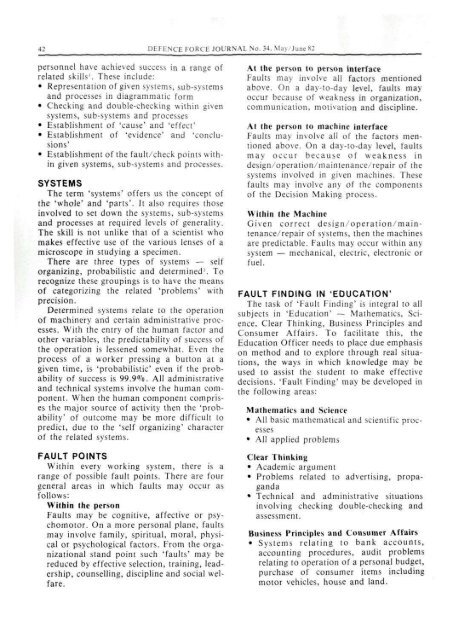ISSUE 34 : May/Jun - 1982 - Australian Defence Force Journal
ISSUE 34 : May/Jun - 1982 - Australian Defence Force Journal
ISSUE 34 : May/Jun - 1982 - Australian Defence Force Journal
Create successful ePaper yourself
Turn your PDF publications into a flip-book with our unique Google optimized e-Paper software.
42 DEFENCE FORCE JOURNAL No. <strong>34</strong>, <strong>May</strong>, <strong>Jun</strong>e 82<br />
personnel have achieved success in a range of<br />
related skills'. These include:<br />
• Representation of given systems, sub-systems<br />
and processes in diagrammatic form<br />
• Checking and double-checking within given<br />
systems, sub-systems and processes<br />
• Establishment of 'cause' and 'effect'<br />
• Establishment of 'evidence' and 'conclusions'<br />
• Establishment of the fault/check points within<br />
given systems, sub-systems and processes.<br />
SYSTEMS<br />
The term 'systems' offers us the concept of<br />
the 'whole' and 'parts'. It also requires those<br />
involved to set down the systems, sub-systems<br />
and processes at required levels of generality.<br />
The skill is not unlike that of a scientist who<br />
makes effective use of the various lenses of a<br />
microscope in studying a specimen.<br />
There are three types of systems — self<br />
organizing, probabilistic and determined : . To<br />
recognize these groupings is to have the means<br />
of categorizing the related 'problems' with<br />
precision.<br />
Determined systems relate to the operation<br />
of machinery and certain administrative processes.<br />
With the entry of the human factor and<br />
other variables, the predictability of success of<br />
the operation is lessened somewhat. Even the<br />
process of a worker pressing a button at a<br />
given time, is 'probabilistic' even if the probability<br />
of success is 99.9%. All administrative<br />
and technical systems involve the human component.<br />
When the human component comprises<br />
the major source of activity then the 'probability'<br />
of outcome may be more difficult to<br />
predict, due to the 'self organizing' character<br />
of the related systems.<br />
FAULT POINTS<br />
Within every working system, there is a<br />
range of possible fault points. There are four<br />
general areas in which faults may occur as<br />
follows:<br />
Within Ihe person<br />
Faults may be cognitive, affective or psychomotor.<br />
On a more personal plane, faults<br />
may involve family, spiritual, moral, physical<br />
or psychological factors. From the organizational<br />
stand point such 'faults' may be<br />
reduced by effective selection, training, leadership,<br />
counselling, discipline and social welfare.<br />
At the person to person interface<br />
Faults may involve all factors mentioned<br />
above. On a day-to-day level, faults may<br />
occur because of weakness in organization,<br />
communication, motivation and discipline.<br />
At the person to machine interface<br />
Faults may involve all of the factors mentioned<br />
above. On a day-to-day level, faults<br />
may occur because of weakness in<br />
design/operation/maintenance/repair of the<br />
systems involved in given machines. These<br />
faults may involve any of the components<br />
of the Decision Making process.<br />
Within the Machine<br />
Given correct design/operation/maintenance/repair<br />
of systems, then the machines<br />
are predictable. Faults may occur within any<br />
system — mechanical, electric, electronic or<br />
fuel.<br />
FAULT FINDING IN 'EDUCATION'<br />
The task of 'Fault Finding' is integral to all<br />
subjects in 'Education' — Mathematics, Science,<br />
Clear Thinking, Business Principles and<br />
Consumer Affairs. To facilitate this, the<br />
Education Officer needs to place due emphasis<br />
on method and to explore through real situations,<br />
the ways in which knowledge may be<br />
used to assist the student to make effective<br />
decisions. 'Fault Finding' may be developed in<br />
the following areas:<br />
Mathematics and Science<br />
• All basic mathematical and scientific processes<br />
• All applied problems<br />
Clear Thinking<br />
• Academic argument<br />
• Problems related to advertising, propaganda<br />
• Technical and administrative situations<br />
involving checking double-checking and<br />
assessment.<br />
Business Principles and Consumer Affairs<br />
• Systems relating to bank accounts,<br />
accounting procedures, audit problems<br />
relating to operation of a personal budget,<br />
purchase of consumer items including<br />
motor vehicles, house and land.

















